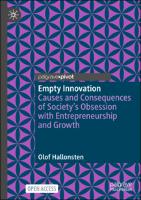Empty Innovation
Causes and Consequences of Society's Obsession with Entrepreneurship and Growth
Abstract
Innovation is generally viewed as something inherently good, a source of progress and prosperity in our society. But innovation can also have negative, unintended, and wasteful effects, if policies are misdirected and organizations pursue innovation to look good and convey a message, rather than to actually achieve improvements of technologies, services, and products. This book makes the case that innovation has become a buzzword, a political cure-all, and increasingly an empty phrase, and that this has become detrimental to innovation itself. Governmental (and supra-governmental) innovation policy is often unrealistically phrased and shaped, and corporate innovation projects are not seldom meaningless acts of window-dressing. The book describes the problems this presents for society, organizations, and individuals, and seeks explanations for why it has come to be this way. Giving way to a more realistic view of what innovation really is, and how it can be accomplished, the book develops a multifaceted sociological and historical argument where several complementary reasons for the prevalence of “empty innovation” are proposed. The book will be of great interest to scholars and students of innovation, entrepreneurship, sustainability, and all those with an interest in the failures of current innovation strategies. This is an open access book.
Keywords
critical studies of innovation; innovation theatre; economization; political governance; innovation policy; corporate innovationDOI
10.1007/978-3-031-31479-7ISBN
9783031314797, 9783031314780, 9783031314797Publisher
Springer NaturePublisher website
https://www.springernature.com/gp/products/booksPublication date and place
Cham, 2023Imprint
Palgrave MacmillanClassification
Business and Management
Entrepreneurship / Start-ups
Industry and industrial studies


 Download
Download Web Shop
Web Shop